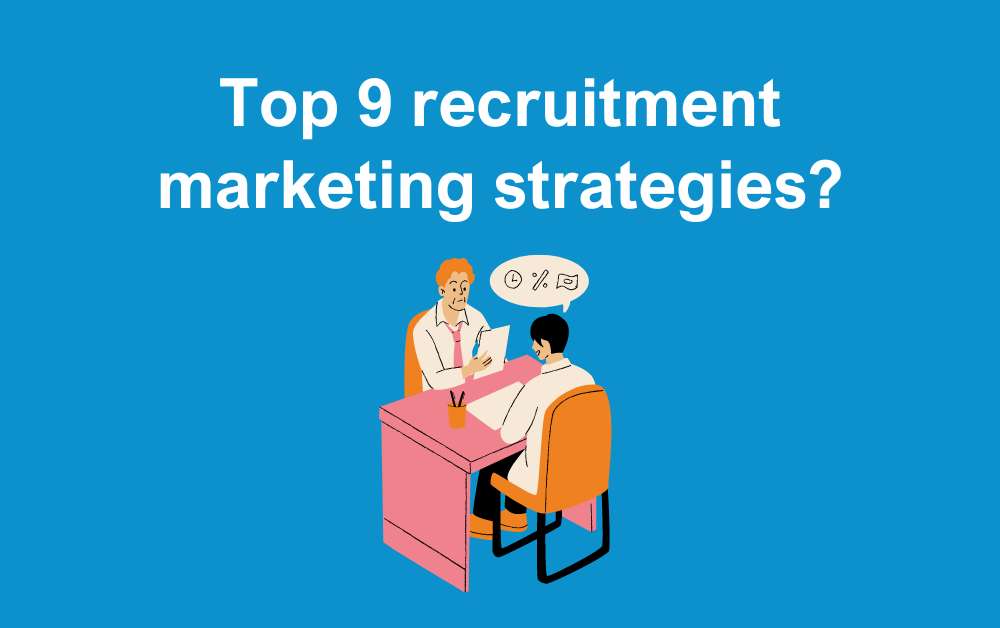Recruitment marketing is the process of promoting an organisation as an attractive employer to potential candidates. Recruiting top talent has always been a challenge for businesses. Furthermore, with the current competitive job market, it has become even more challenging. The traditional approach of posting job openings and waiting for candidates to apply is no longer enough. Organisations now need to take a more proactive approach by marketing themselves as desirable employers and reaching out to potential candidates directly.
In this blog, we’ll explore the top 9 recruitment marketing strategies that can help your organisation stand out and attract the best candidates.
Employer Branding
Employer branding is a critical aspect of attracting and retaining talented employees. It’s the process of establishing your business as a desirable place to work. Employer branding involves building a strong company culture, highlighting your values, and showcasing your employee experience. A strong employer brand can help attract and retain top talent by making your organisation stand out in a crowded job market.
Candidates are more likely to be attracted to companies that they perceive as having a positive and supportive work environment. A positive employer brand can also improve your organisation’s reputation and help you attract a diverse pool of candidates. To build a strong employer brand, organisations need to be intentional about their messaging, actively engage with employees, and promote their culture and values through various marketing channels. We encourage you to include this in your recruitment marketing strategy.
Job Descriptions
Your job descriptions should be clear, concise, and engaging. They should highlight the essential skills and qualifications required for the job, as well as the benefits of working for your organisation. Use language that resonates with your target audience and emphasises your unique selling points.
Employee Referral Programs
Another effective strategy is employee referral programs. Employee referrals are a powerful tool for attracting top talent to your organisation. Referrals from current employees tend to be more qualified, more likely to be a good fit, and more likely to stay with the company long-term.
Employee referral programs incentivise employees to refer their friends and colleagues to open positions by offering rewards such as bonuses, extra vacation days, or other incentives. These programs can also help boost employee engagement and morale by giving employees a sense of ownership and investment in the recruitment process.
To be successful with employee referral programs, it’s essential to communicate clearly with employees about the program and the rewards available, actively promote the program through various channels, and provide a smooth and easy referral process for employees.
Social Media Marketing
Social media marketing is an essential part of recruitment marketing. Platforms like LinkedIn, Twitter, and Facebook offer an effective way to promote your business and reach a broader audience. These platforms allow you to share job openings, showcase your culture and employee experience, and engage with potential candidates.
Social media marketing can also help you build brand awareness and establish your business as an industry leader. To be successful with social media marketing, it’s essential to have a clear strategy in place. You should identify your target audience and the platforms they use, develop engaging content that resonates with your audience, and actively engage with candidates and followers. Social media marketing can be time-consuming, but the benefits of building a strong online presence can be significant.
Employer Review Sites
Sites like Glassdoor and Indeed allow current and former employees to rate and review their employers. Ensure that your organisation has a positive presence on these sites by responding to reviews, addressing any concerns, and highlighting your strengths.
Recruitment Events
Another recruitment marketing strategy is to participate in job fairs, industry events, and other recruitment events to connect with potential candidates in person. These events allow you to showcase your company culture, answer questions, and collect resumes.
Employee Testimonials
Use employee testimonials to showcase your company culture and highlight the benefits of working for your business. Encourage current employees to share their positive experiences on your website, social media, and other marketing materials.
Mobile Recruitment
Mobile devices are now the primary way people access the internet, so it’s essential to optimise your recruitment marketing for mobile devices. Ensure that your career site and application process are mobile-friendly and easy to use.
Data-Driven Recruitment
Use data analytics to track the effectiveness of your recruitment marketing strategies. Monitor metrics like the number of applicants, time to hire, and cost per hire to identify areas for improvement and make data-driven decisions.
Conclusion
Recruitment marketing is a crucial aspect of attracting top talent to your organisation. By implementing these 9 strategies, you can build a strong employer brand, engage with potential candidates, and ultimately make more successful hires. If you would like support with recruitment marketing, feel free to contact us. You can also take a look at our recruitment service on our website.







